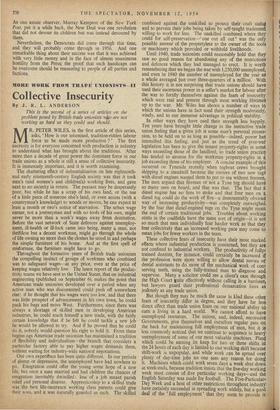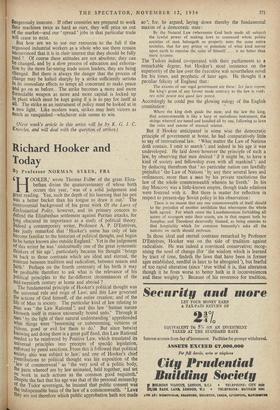MORE WORK FROM TRAVE IJNIONISTS—II
Collective Insecurity
By J. R. L. ANDERSON This is the second of a series of articles on the problem posed by British trade unionists who are not working as hard as they could and should.
MR. PETER WILES, in the first article of this series, asks, 'How is our unionised, tradition-ridden labour force to be made more productive ? ' The first necessity is for everyone concerned with production in industry to understand what has brought about the traditions. After more than a decade of great power the dominant force in our trade unions as a whole is still a sense of collective insecurity. It is immensely important, and it is worth examining. The shattering effect of industrialisation on late eighteenth- and early nineteenth-century English society was that it took men's (and women's and children's) working lives, and gave next to no security in return. The peasant may be desperately poor, but while he has a scrap of his own land, or the use of a little piece of someone else's land, or even access (with a countryman's knowledge) to woods or moors, he can expect 'at least a month or two's notice of starvation. The urban wage earner, not a journeyman and with no tools of his own, might never be more than a week's wages away frOm destitution. Before the vast network of State defences against unemploy- ment, ill-health or ill-luck came into being, many a man, not thriftless but a decent workman, might go through the whole of life owning no more than the clothes he stood in and perhaps the simple furniture of his home. And at the first spell of misfortune, the furniture might have to go.
Throughout the formative years of British trade unionism the compelling instinct of groups of workmen who combined was to safeguard wages—at any price; even at the price of keeping wages relatively low. The latest report of the produc- tivity teams we have sent to the United States, that on industrial engineering (published on September 6), makes the point that American trade unionism developed over a period when any active man who was discontented could push off somewhere else: if he thought that his wages were too low, and that there was little prospect of advancement in his own town, he could pack his bags and move West. Furthermore, since there was always a shortage of skilled men in developing American industries, he could teach himself a new trade, with the fairly certain knowledge that if he felt he could tackle a new job he would be allowed to try. And if he proved that he could do it. nobody would question his right to hold it. From these beginn:ngs American trade unionism has maintained a tradition of flexibility and individualism—the branch that considers a particular factory able to pay higher wages demands them, without waiting for industry-wide national negotiations.
Our own experience has been quite different. In our periods of slump or depression, the unemployed have had nowhere to go. Emigration could offer the young some hope of a new life, but once a man married and had children the chances of emigration inevitably dwindled : loss of a job meant parish relief and personal disaster. Apprenticeship to a skilled trade was the best life-insurance working class parents could give their sons, and it was naturally guarded as such. The skilled combined against the unskilled to protect their craft statul and to prevent their jobs being taken by self-taught tradesmeft willing to work for less. The unskilled combined where they could for self-preservation—' one out all out' was the only possible answer of the propertyless to the owner of the tools or machinery which provided or withheld livelihoods. Until 1940, trade unionists could reasonably hold that they saw no good reason for abandoning any of the restrictions and defences which they had managed to erect. It is worth remembering that we began the war with 1,250,000 unemployed, and even in 1940 the number of unemployed for the year a9 a whole averaged just over three-quarters of a million. With this history it is not surprising that trade unions should have used their enormous power in a seller's market for labour after the war to fortify themselves against the fears of insecurity which were real and present through most working lifetime$ up to the war. Mr. Wiles has shown a number of ways in which the unions have in fact used their strength moderately, wisely, and to our immense advantage in political stability.
In other ways they have used their strength less happily, Ten years have brought little change in the instinctive trade union feeling that a given job is some man's personal posses- sion, to be held on to as long as possible—indeed, power hai intensified this feeling, and just as the trend of post-war legislation has been to give the tenant property-rights in some ways exceeding those of the landlord, so trade union practicq has tended to assume for the workman property-rights in 4 job exceeding those of his employer. A concise example of thie occurred on Tyneside recently when tugboat crews brought shipping to a standstill because the owners of two new tug9 with diesel engines wanted them to put to sea without firemen? The men argued that fireman or not a Tyne tug should have so many men on board, and that was that. The fact that ft diesel engine has no fires to stoke and that four men on a diesel tug could do the work of five—a demonstrably obvioui way of increasing productivity—was completely outweighed by the fear that diesel-engined tugs on the Tyne might mean the end of certain traditional jobs. Troubles about working stints in the coalfields have the same sort of origin—it is not so much that men individually fear harder work as that they fear collectively that an increased working pace may come to mean jobs for fewer workers in the team.
These collective fears of insecurity have their most marked effects where industrial production is concerned, but they are not confined to industrial workers. The productivity of fully. trained dentists, for instance, could certainly be increased if the profession were more willing to allow dental nurses or dental assistants to do more of the mechanical work of con., serving teeth, using the fully-trained man to diagnose and supervise. Many a solicitor could see a client's case through the High Court quite effectively without calling In a barristers but lawyers guard their professional demarcation lines as jealously as any trade union.
But though they may be much the same in kind these other fears of insecurity differ in degree, and they have far less direct effect than trade union fears on our national ability tc:t earn a living in a hard world. We cannot afford to have unemployed resources. The unions, and, indeed, successive Governments, give themselves and ourselves regular pats on the back for maintaining full employment of men, but it is less commonly noticed that we continue to acquiesce in heavy unemployment of some of our most valuable machines. Plant which could be earning its keep for two or three shifts in the 24 hours of each day is limited to one working shift because shift-work is unpopular, and while work can be spread over plenty of day-time jobs no one sees any reason for doing it. Machines which could work seven days a week shut down at week-ends, because tradition insists that the five-day working week must consist of five particular working days—and the English Saturday was made for football. The Five-Particular. Day Week and a host of other restrictions throughout industry have certainly succeeded in spreading work widely, but a good deal of the 'full employment' that they seem to provide is dangerously insecure. If other countries are prepared to work their machines twice as hard as ours, they will price us out of the market—and our ' spread ' jobs in that particular trade Will cease to exist.
But how are we to use our resources to the full if the organised industrial workers as a whole who use them remain Unconvinced that it is in their interest that they should be fully Used ? Of course these attitudes are not absolute; they can be changed, and by a slow process of education and exhorta- tion by the more far-seeing trade union leaders, they are being Changed. But there is always the danger that the process of Change may be halted sharply by a strike sufficiently serious in its immediate effects to tempt all concerned to make peace and go on as before. The strike becomes a more and more formidable weapon as more and more capital is locked up in plant which must be kept going if it is to pay for itself at all. The strike as an instrument of policy must be looked at in a new light. Like modern wars, strikes may hurt victors as rauch as vanquished—whichever side seems to win.
(Next week's article in this series will be by K. G. I. C. Knowles, and will deal with the question of strikes.)



































 Previous page
Previous page